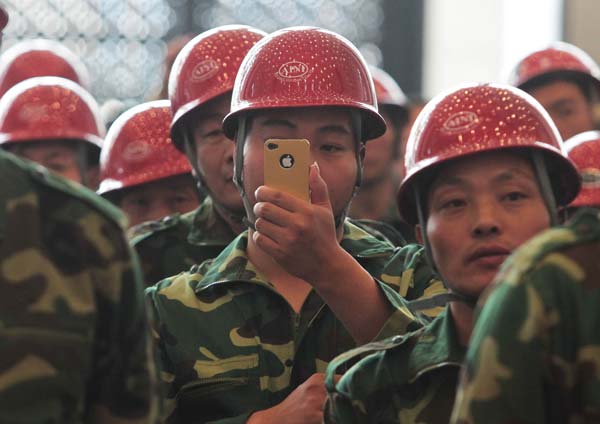Migrant workers have help at hand
Updated: 2012-11-19 07:50
(China Daily)
|
||||||||
Smartphones give low earners options, reports Zhang Yuchen in Beijing.
Modern technology is not only changing the way people work, it is changing the way people, from the highest earners to the lowest, live.
Tang Jianhua, a mother of two, is working at a construction site in northwestern Beijing. She opted for construction work three months ago after she moved up from southern China because of higher pay.
One of the major financial outlays for Tang, 38, was to buy a smartphone for 900-yuan ($144). And after tragedy struck, it also helped rebuild her life. Following the death of her husband, she was able to keep in touch with family and friends and through modern technology, start the painful but necessary process of rejoining society.
She posted messages online via her smartphone and through this connection met someone and later remarried.
Tang's story may be a simple one, but it reflects the situation of low-grade workers, who have only recently embraced technology.
"Smartphones are like vitamins to these people," said Kuang Wenbo, a professor of communications and journalism at Renmin University in Beijing.
According to a survey of blue-collar workers conducted in May, 74 percent of the 22,380 respondents said they accessed the Web through their phones. The survey, conducted by Daguu, an online employment services company that focuses on market demand for low-end labor, indicated that phone use among migrant workers is 2 percent higher than the national average.
Migrant workers account for 60 to 70 percent of smartphone purchases, said a saleswoman named Li who works at the Zhongguancun IT compound, a technological hub in the Haidian district of Beijing.
The workers use their phones to look for jobs, make online purchases, search for information and, most prevalently, play online games and read literature. Their Internet service fees may be as much as 200 yuan per month.
"Because of their living and working habits, these workers have limited access to the outside world through newspapers or other forms of media," said Kuang, "Smartphones have become the most convenient way of keeping up with events and family."
By the second quarter of this year, 45 percent of the handhelds used by Chinese people were smartphones, 33.7 percent of which cost 700 yuan to 1,000 yuan, according to Sino Market Research, a research institution affiliated with the National Bureau of Statistics.
Experts explained that the wide variety of options available in brands and prices means that this easily neglected group, have a chance to change their lifestyles.
 |
|
Gao Qiang, a migrant worker at a construction site in Beijing, realizes that a smartphone is an indispensable part of his daily life. Zhu Xingxin / China Daily |
Entertainment, shopping
Zhao Yongchao has been working on external insulation work at a residential building in Haidian since July. With the next construction project settled, Zhao will soon leave for another region, a suburban county located in Northeast Beijing.
Most of the day is spent on tedious and laborious tasks, but the 28-year-old migrant worker's smartphone provides his colleagues with convenient shopping opportunities and entertainment.
A work colleague used Zhao's iPhone, a gift from his sister, to buy a 500-yuan outfit, consisting of shoes, pants and jacket: "I'm quite satisfied," said Wang Cong, looking down at his pants and brushing off the dust.
In addition to shopping, online money transfers have become a monthly favor Zhao performs for colleagues. They give him the cash and he does the rest.
"Every month they give me the money they want to pay into the bank. I log onto the online banking application on my smartphone and transfer the money to the bank," Zhao said, "I have downloaded applications from two banks. They work very well,"
Each transfer costs Zhao 1 yuan, but that "doesn't matter" compared with the friendships he has built with his co-workers.

 Relief reaches isolated village
Relief reaches isolated village
 Rainfall poses new threats to quake-hit region
Rainfall poses new threats to quake-hit region
 Funerals begin for Boston bombing victims
Funerals begin for Boston bombing victims
 Quake takeaway from China's Air Force
Quake takeaway from China's Air Force
 Obama celebrates young inventors at science fair
Obama celebrates young inventors at science fair
 Earth Day marked around the world
Earth Day marked around the world
 Volunteer team helping students find sense of normalcy
Volunteer team helping students find sense of normalcy
 Ethnic groups quick to join rescue efforts
Ethnic groups quick to join rescue efforts
Most Viewed
Editor's Picks

|

|

|

|

|

|
Today's Top News
Health new priority for quake zone
Xi meets US top military officer
Japan's boats driven out of Diaoyu
China mulls online shopping legislation
Bird flu death toll rises to 22
Putin appoints new ambassador to China
Japanese ships blocked from Diaoyu Islands
Inspired by Guan, more Chinese pick up golf
US Weekly

|

|







